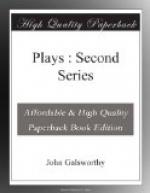intent and treated as a patient. I admit that
this is a plea which might well be abused. It
is a matter for discretion. But here you have
a case in which there is every reason to give the
benefit of the doubt. You heard me ask the prisoner
what he thought of during those four fatal minutes.
What was his answer? “I thought of Mr.
Cokeson’s face!” Gentlemen, no man could
invent an answer like that; it is absolutely stamped
with truth. You have seen the great affection
[legitimate or not] existing between him and this woman,
who came here to give evidence for him at the risk
of her life. It is impossible for you to doubt
his distress on the morning when he committed this
act. We well know what terrible havoc such distress
can make in weak and highly nervous people. It
was all the work of a moment. The rest has followed,
as death follows a stab to the heart, or water drops
if you hold up a jug to empty it. Believe me,
gentlemen, there is nothing more tragic in life than
the utter impossibility of changing what you have
done. Once this cheque was altered and presented,
the work of four minutes—four mad minutes
—the rest has been silence. But in
those four minutes the boy before you has slipped
through a door, hardly opened, into that great cage
which never again quite lets a man go—the
cage of the Law. His further acts, his failure
to confess, the alteration of the counterfoil, his
preparations for flight, are all evidence—not
of deliberate and guilty intention when he committed
the prime act from which these subsequent acts arose;
no—they are merely evidence of the weak
character which is clearly enough his misfortune.
But is a man to be lost because he is bred and born
with a weak character? Gentlemen, men like the
prisoner are destroyed daily under our law for want
of that human insight which sees them as they are,
patients, and not criminals. If the prisoner
be found guilty, and treated as though he were a criminal
type, he will, as all experience shows, in all probability
become one. I beg you not to return a verdict
that may thrust him back into prison and brand him
for ever. Gentlemen, Justice is a machine that,
when some one has once given it the starting push,
rolls on of itself. Is this young man to be ground
to pieces under this machine for an act which at the
worst was one of weakness? Is he to become a
member of the luckless crews that man those dark,
ill-starred ships called prisons? Is that to
be his voyage-from which so few return? Or is
he to have another chance, to be still looked on as
one who has gone a little astray, but who will come
back? I urge you, gentlemen, do not ruin this
young man! For, as a result of those four minutes,
ruin, utter and irretrievable, stares him in the face.
He can be saved now. Imprison him as a criminal,
and I affirm to you that he will be lost. He
has neither the face nor the manner of one who can
survive that terrible ordeal. Weigh in the scales




